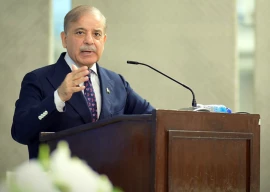
They could not enter the violence-ravaged and drone-hit tribal area, South Waziristan, so on their return to the federal capital, they went on a symbolic hunger strike near Super Market in a posh sector of the capital, to protest the indiscriminate death and destruction caused by the predator pilotless plane.
Declared the most dangerous place on earth by the US establishment, the most volatile area of Pakistan’s tribal belt was the ultimate destination of peace marchers comprising members of CodePink, a women-initiated movement against US-funded wars and occupations and working for social justice.
They were forced to turn back from Tank district, the gateway to South Waziristan, in Khyber-Pakhtunkhwa. “We were told the way ahead was blocked so we could not proceed,” said Paul Popper from Canada, a member of the US peace delegation that arrived last week to protest drone strikes in the tribal areas.
Popper said they were informed by PTI chief Imran Khan about the road blockade. He added that he and his colleagues would have liked to reach Waziristan, but they did not press on. “I was a little afraid initially but once we were on our way I was fine. But then we could not ignore the security advisory from people who organised the march.”
They would have been the first independent observers from outside tribal areas after a long time to give a first-hand account of people suffering from drone strikes had they been allowed to enter South Waziristan. The whole world was watching.
“This is exactly why I’m disappointed about not making it,” said Bolly Bahoney, another member of the US delegation. She was fasting to protest the drone strikes. Bahoney said their march attracted the foreign media. “I hope our message and the true picture about casualties from drone strikes would have reached Americans.”
“In the US, people are fed the wrong information on drone strikes. They are never shown innocent civilians dying of the attacks so they don’t bother,” said Bahoney. She added that the coverage of the peace march would help them carry on their anti-drones campaign forward once they return to the US. “It will help a great deal and we hope we will be able to make some dent because people in the US were unmoved on drone strikes,” said Brenda Baraquil, a Muslim from Los Angeles, California.
Participants of the march, who could not reach Waziristan, said all was not lost. Their going even as far as Tank would pay dividends and publicise their cause, they added.
The youngest member of the delegation, Alli McCracken, 23, from Washington DC confessed she was a little scared in the beginning. “But then I thought about the people of Waziristan who have drones flying over their heads every day and I discarded my fear,” said McCracken.
She said she knew people who were drone pilots and came to know how a person sitting in the US could kill people with a joystick. “I thought it was wrong. I was moved to see for myself and do something to stop it so I decided to come with the delegation to Pakistan,” she added. She said contrary to her perceived image of Pakistanis, she found people here were against the US government, not anti-American . “They are peace-loving,” she said.
Participants of hunger strike chanted band karo band karo drone hamlay band karo (Stop drone attacks). Some of them will leave for the US while others will stay to participate in more protests and conferences to oppose drones.
Published in The Express Tribune, October 10th, 2012.








1732617223-01732807573-0/Untitled-design-(69)1732617223-01732807573-0-270x192.webp)








COMMENTS
Comments are moderated and generally will be posted if they are on-topic and not abusive.
For more information, please see our Comments FAQ